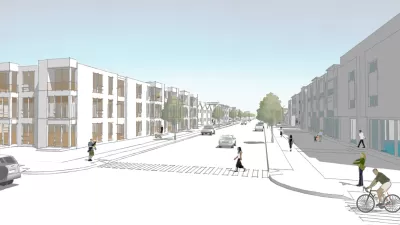Inclusionary zoning and weakened urban growth boundaries are not effective tools for reducing the price of housing. Joe Cortright of City Observatory suggests ending parking requirements instead.
Joe Cortright analyzes the potential consequences of a political trade off regarding a process to reform some of the regulations that impact land use and development in Oregon.
As has already been reported, the Oregon State Legislature is considering a package of bills that could overturn the state's ban on inclusionary zoning. The legislation is proposed as a measure to counter the state's rising affordability problem. In the negotations leading up the inclusionary zoning legislation, the development and building industries is asking for something in return:
As a quid pro quo for agreeing to drop the ban—at least for rental housing—the development industry is suggesting it would like to see the state’s land use laws, including its signature urban growth boundary, weakened.
Cortright's focuses on the consequences of "bursting" Portland's urban growth boundary. In fact, Cortright says that possibility, combined with new inclusionary zoning, would likely make Portland's affordability worse.
To back up his larger claim, Cortright lays out a seven-point argument, each detailed in the article. Here's an abridged version of the list:
- Affordability is about growing up, not out.
- The market demand/affordability problem is in the urban core.
- Adding more supply in the core is the key to addressing affordability.
- Inclusionary zoning increases market prices.
- Inclusionary zoning creates only token numbers of affordable units.
- Inclusionary zoning requirements would encourage further sprawl.
- If we want to make housing more affordable, let’s get rid of parking requirements.
FULL STORY: Bursting Portland’s urban growth boundary won’t make housing more affordable

Alabama: Trump Terminates Settlements for Black Communities Harmed By Raw Sewage
Trump deemed the landmark civil rights agreement “illegal DEI and environmental justice policy.”

Study: Maui’s Plan to Convert Vacation Rentals to Long-Term Housing Could Cause Nearly $1 Billion Economic Loss
The plan would reduce visitor accommodation by 25% resulting in 1,900 jobs lost.

Planetizen Federal Action Tracker
A weekly monitor of how Trump’s orders and actions are impacting planners and planning in America.

Waymo Gets Permission to Map SF’s Market Street
If allowed to operate on the traffic-restricted street, Waymo’s autonomous taxis would have a leg up over ride-hailing competitors — and counter the city’s efforts to grow bike and pedestrian on the thoroughfare.

Parklet Symposium Highlights the Success of Shared Spaces
Parklets got a boost during the Covid-19 pandemic, when the concept was translated to outdoor dining programs that offered restaurants a lifeline during the shutdown.

Federal Homelessness Agency Places Entire Staff on Leave
The U.S. Interagency Council on Homelessness is the only federal agency dedicated to preventing and ending homelessness.
Urban Design for Planners 1: Software Tools
This six-course series explores essential urban design concepts using open source software and equips planners with the tools they need to participate fully in the urban design process.
Planning for Universal Design
Learn the tools for implementing Universal Design in planning regulations.
Caltrans
Smith Gee Studio
Institute for Housing and Urban Development Studies (IHS)
City of Grandview
Harvard GSD Executive Education
Toledo-Lucas County Plan Commissions
Salt Lake City
NYU Wagner Graduate School of Public Service





























